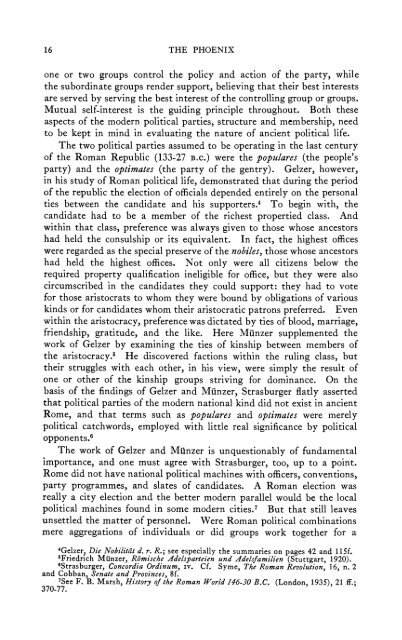Catiline and the "Concordia Ordinum" - Historia Antigua
Catiline and the "Concordia Ordinum" - Historia Antigua
Catiline and the "Concordia Ordinum" - Historia Antigua
Create successful ePaper yourself
Turn your PDF publications into a flip-book with our unique Google optimized e-Paper software.
16 THE PHOENIX<br />
one or two groups control <strong>the</strong> policy <strong>and</strong> action of <strong>the</strong> party, while<br />
<strong>the</strong> subordinate groups render support, believing that <strong>the</strong>ir best interests<br />
are served by serving <strong>the</strong> best interest of <strong>the</strong> controlling group or groups.<br />
Mutual self-interest is <strong>the</strong> guiding principle throughout. Both <strong>the</strong>se<br />
aspects of <strong>the</strong> modern political parties, structure <strong>and</strong> membership, need<br />
to be kept in mind in evaluating <strong>the</strong> nature of ancient political life.<br />
The two political parties assumed to be operating in <strong>the</strong> last century<br />
of <strong>the</strong> Roman Republic (133-27 B.c.) were <strong>the</strong> populares (<strong>the</strong> people's<br />
party) <strong>and</strong> <strong>the</strong> optimates (<strong>the</strong> party of <strong>the</strong> gentry). Gelzer, however,<br />
in his study of Roman political life, demonstrated that during <strong>the</strong> period<br />
of <strong>the</strong> republic <strong>the</strong> election of officials depended entirely on <strong>the</strong> personal<br />
ties between <strong>the</strong> c<strong>and</strong>idate <strong>and</strong> his supporters.4 To begin with, <strong>the</strong><br />
c<strong>and</strong>idate had to be a member of <strong>the</strong> richest propertied class. And<br />
within that class, preference was always given to those whose ancestors<br />
had held <strong>the</strong> consulship or its equivalent. In fact, <strong>the</strong> highest offices<br />
were regarded as <strong>the</strong> special preserve of <strong>the</strong> nobiles, those whose ancestors<br />
had held <strong>the</strong> highest offices. Not only were all citizens below <strong>the</strong><br />
required property qualification ineligible for office, but <strong>the</strong>y were also<br />
circumscribed in <strong>the</strong> c<strong>and</strong>idates <strong>the</strong>y could support: <strong>the</strong>y had to vote<br />
for those aristocrats to whom <strong>the</strong>y were bound by obligations of various<br />
kinds or for c<strong>and</strong>idates whom <strong>the</strong>ir aristocratic patrons preferred. Even<br />
within <strong>the</strong> aristocracy, preference was dictated by ties of blood, marriage,<br />
friendship, gratitude, <strong>and</strong> <strong>the</strong> like. Here Mfiinzer supplemented <strong>the</strong><br />
work of Gelzer by examining <strong>the</strong> ties of kinship between members of<br />
<strong>the</strong> aristocracy.5 He discovered factions within <strong>the</strong> ruling class, but<br />
<strong>the</strong>ir struggles with each o<strong>the</strong>r, in his view, were simply <strong>the</strong> result of<br />
one or o<strong>the</strong>r of <strong>the</strong> kinship groups striving for dominance. On <strong>the</strong><br />
basis of <strong>the</strong> findings of Gelzer <strong>and</strong> Miinzer, Strasburger flatly asserted<br />
that political parties of <strong>the</strong> modern national kind did not exist in ancient<br />
Rome, <strong>and</strong> that terms such as populares <strong>and</strong> optimates were merely<br />
political catchwords, employed with little real significance by political<br />
opponents.6<br />
The work of Gelzer <strong>and</strong> Mtinzer is unquestionably of fundamental<br />
importance, <strong>and</strong> one must agree with Strasburger, too, up to a point.<br />
Rome did not have national political machines with officers, conventions,<br />
party programmes, <strong>and</strong> slates of c<strong>and</strong>idates. A Roman election was<br />
really a city election <strong>and</strong> <strong>the</strong> better modern parallel would be <strong>the</strong> local<br />
political machines found in some modern cities.7 But that still leaves<br />
unsettled <strong>the</strong> matter of personnel. Were Roman political combinations<br />
mere aggregations of individuals or did groups work toge<strong>the</strong>r for a<br />
4Gelzer, Die Nobilitdt d. r. R.; see especially <strong>the</strong> summaries on pages 42 <strong>and</strong> 115f.<br />
5Friedrich Miinzer, Romische Adelsparteien und Adelsfamilien (Stuttgart, 1920).<br />
6Strasburger, <strong>Concordia</strong> Ordinum, Iv. Cf. Syme, The Roman Revolution, 16, n. 2<br />
<strong>and</strong> Cobban, Senate <strong>and</strong> Provinces, 8f.<br />
7See F. B. Marsh, History of <strong>the</strong> Roman World 146-30 B.C. (London, 1935), 21 ff.;<br />
370-77.

















